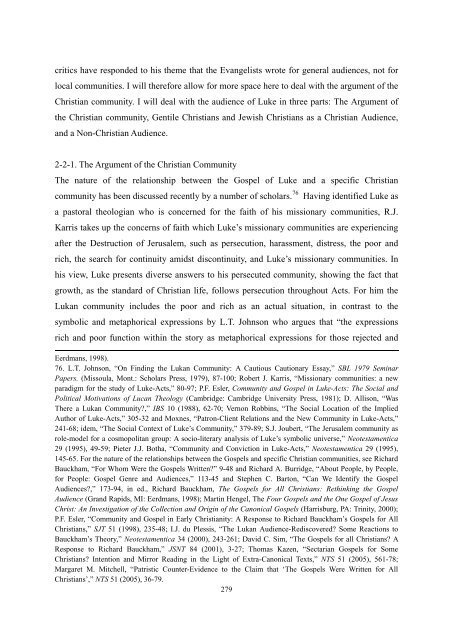the role of the lukan parables in terms of the purpose of luke's gospel
the role of the lukan parables in terms of the purpose of luke's gospel
the role of the lukan parables in terms of the purpose of luke's gospel
You also want an ePaper? Increase the reach of your titles
YUMPU automatically turns print PDFs into web optimized ePapers that Google loves.
critics have responded to his <strong>the</strong>me that <strong>the</strong> Evangelists wrote for general audiences, not for<br />
local communities. I will <strong>the</strong>refore allow for more space here to deal with <strong>the</strong> argument <strong>of</strong> <strong>the</strong><br />
Christian community. I will deal with <strong>the</strong> audience <strong>of</strong> Luke <strong>in</strong> three parts: The Argument <strong>of</strong><br />
<strong>the</strong> Christian community, Gentile Christians and Jewish Christians as a Christian Audience,<br />
and a Non-Christian Audience.<br />
2-2-1. The Argument <strong>of</strong> <strong>the</strong> Christian Community<br />
The nature <strong>of</strong> <strong>the</strong> relationship between <strong>the</strong> Gospel <strong>of</strong> Luke and a specific Christian<br />
community has been discussed recently by a number <strong>of</strong> scholars. 76<br />
Hav<strong>in</strong>g identified Luke as<br />
a pastoral <strong>the</strong>ologian who is concerned for <strong>the</strong> faith <strong>of</strong> his missionary communities, R.J.<br />
Karris takes up <strong>the</strong> concerns <strong>of</strong> faith which Luke’s missionary communities are experienc<strong>in</strong>g<br />
after <strong>the</strong> Destruction <strong>of</strong> Jerusalem, such as persecution, harassment, distress, <strong>the</strong> poor and<br />
rich, <strong>the</strong> search for cont<strong>in</strong>uity amidst discont<strong>in</strong>uity, and Luke’s missionary communities. In<br />
his view, Luke presents diverse answers to his persecuted community, show<strong>in</strong>g <strong>the</strong> fact that<br />
growth, as <strong>the</strong> standard <strong>of</strong> Christian life, follows persecution throughout Acts. For him <strong>the</strong><br />
Lukan community <strong>in</strong>cludes <strong>the</strong> poor and rich as an actual situation, <strong>in</strong> contrast to <strong>the</strong><br />
symbolic and metaphorical expressions by L.T. Johnson who argues that “<strong>the</strong> expressions<br />
rich and poor function with<strong>in</strong> <strong>the</strong> story as metaphorical expressions for those rejected and<br />
Eerdmans, 1998).<br />
76. L.T. Johnson, “On F<strong>in</strong>d<strong>in</strong>g <strong>the</strong> Lukan Community: A Cautious Cautionary Essay,” SBL 1979 Sem<strong>in</strong>ar<br />
Papers. (Missoula, Mont.: Scholars Press, 1979), 87-100; Robert J. Karris, “Missionary communities: a new<br />
paradigm for <strong>the</strong> study <strong>of</strong> Luke-Acts,” 80-97; P.F. Esler, Community and Gospel <strong>in</strong> Luke-Acts: The Social and<br />
Political Motivations <strong>of</strong> Lucan Theology (Cambridge: Cambridge University Press, 1981); D. Allison, “Was<br />
There a Lukan Community?,” IBS 10 (1988), 62-70; Vernon Robb<strong>in</strong>s, “The Social Location <strong>of</strong> <strong>the</strong> Implied<br />
Author <strong>of</strong> Luke-Acts,” 305-32 and Moxnes, “Patron-Client Relations and <strong>the</strong> New Community <strong>in</strong> Luke-Acts,”<br />
241-68; idem, “The Social Context <strong>of</strong> Luke’s Community,” 379-89; S.J. Joubert, “The Jerusalem community as<br />
<strong>role</strong>-model for a cosmopolitan group: A socio-literary analysis <strong>of</strong> Luke’s symbolic universe,” Neotestamentica<br />
29 (1995), 49-59; Pieter J.J. Botha, “Community and Conviction <strong>in</strong> Luke-Acts,” Neotestamentica 29 (1995),<br />
145-65. For <strong>the</strong> nature <strong>of</strong> <strong>the</strong> relationships between <strong>the</strong> Gospels and specific Christian communities, see Richard<br />
Bauckham, “For Whom Were <strong>the</strong> Gospels Written?” 9-48 and Richard A. Burridge, “About People, by People,<br />
for People: Gospel Genre and Audiences,” 113-45 and Stephen C. Barton, “Can We Identify <strong>the</strong> Gospel<br />
Audiences?,” 173-94, <strong>in</strong> ed., Richard Bauckham, The Gospels for All Christians: Reth<strong>in</strong>k<strong>in</strong>g <strong>the</strong> Gospel<br />
Audience (Grand Rapids, MI: Eerdmans, 1998); Mart<strong>in</strong> Hengel, The Four Gospels and <strong>the</strong> One Gospel <strong>of</strong> Jesus<br />
Christ: An Investigation <strong>of</strong> <strong>the</strong> Collection and Orig<strong>in</strong> <strong>of</strong> <strong>the</strong> Canonical Gospels (Harrisburg, PA: Tr<strong>in</strong>ity, 2000);<br />
P.F. Esler, “Community and Gospel <strong>in</strong> Early Christianity: A Response to Richard Bauckham’s Gospels for All<br />
Christians,” SJT 51 (1998), 235-48; I.J. du Plessis, “The Lukan Audience-Rediscovered? Some Reactions to<br />
Bauckham’s Theory,” Neotestamentica 34 (2000), 243-261; David C. Sim, “The Gospels for all Christians? A<br />
Response to Richard Bauckham,” JSNT 84 (2001), 3-27; Thomas Kazen, “Sectarian Gospels for Some<br />
Christians? Intention and Mirror Read<strong>in</strong>g <strong>in</strong> <strong>the</strong> Light <strong>of</strong> Extra-Canonical Texts,” NTS 51 (2005), 561-78;<br />
Margaret M. Mitchell, “Patristic Counter-Evidence to <strong>the</strong> Claim that ‘The Gospels Were Written for All<br />
Christians’,” NTS 51 (2005), 36-79.<br />
279
















